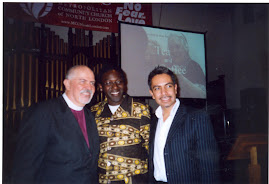Nigerian sued over play on "abuses" of sharia law Sun 7 Oct 2007, 10:50 GMT
By Estelle Shirbon
ABUJA (Reuters) - A Nigerian human rights activist is being sued in an Islamic court over a play he wrote exposing what he calls abuses and double standards by those implementing sharia law in 12 northern Nigerian states. Shehu Sani, a well-known activist and author, said an upper sharia court in Kaduna state had ordered him to cancel a planned performance of "Phantom Crescent" and to stop printing or distributing the play. This was after a group called Concerned Sharia Forum launched a suit against him.
"I wanted to enlighten the citizenry on how sharia is being used to oppress them. It dramatises the human rights abuses and the harassment of women and poor people by members of the Hisbah," he told Reuters by telephone from Kaduna on Sunday. The Hisbah are sharia enforcement squads active in the 12 Nigerian states that introduced stricter punitive aspects of Islamic law in 2000 -- a decision that alienated sizeable Christian minorities and sparked bouts of violence that killed thousands. Hisbah committees in some of the states have sometimes burnt books deemed immoral, shut down bars where alcohol was served or stopped women from using motorcycle taxis to prevent them from touching male drivers.
"There are so many double standards. It's only the poor who are oppressed. The governors of sharia states usually loot public resources while advocating morality," said Sani, who is a practising Muslim. The predominantly Muslim north is the poorest part of Nigeria and has the highest mortality rates. Several ex-governors of sharia states are under investigation for corruption. The former governor of Jigawa, which has some of the worst health and poverty statistics in Nigeria, was charged in July with stealing about $225 million.
Sani said the first hearing in the suit brought against him over his play was scheduled for Tuesday and he would defend his work in court. Sharia courts have been active for centuries but under British colonial rule their powers were curtailed. In the 12 states, they regained the right to impose stricter punishments such as death for adultery or sodomy, or amputation for theft. The northern governors argued that they were acting in the interests of public morality and that the people craved stricter sharia compliance. Critics say they played on religious sentiment to gain popular support for their re-election bids.
Subscribe to:
Post Comments (Atom)




1 comment:
From Malaysia with love
Post a Comment